New MOU Targets Large Scale Restoration of Montana’s Bitterroot National Forest

Partners set to begin 16,000-acre forest health project in southwest Montana
Darby, Mont. – A new Memorandum of Understanding recently signed between Pheasants Forever, Blue Forest, and the U.S. Forest Service sets the stage for meaningful conservation work across Montana’s Bitterroot Valley through 2028. Starting later this summer, the partners will begin implementation in the Nez/Mud area of the Mud Creek Project, a 16,933-acre restoration plan to improve forest health, reduce fuel loads, and contribute to watershed/habitat improvement in southwest Montana. While work is being executed, the partnership is working to develop new financial solutions that will allow them to implement future forest health and fire risk reductions much more quickly.
Located in the Rocky Mountains, the Bitterroot National Forest/Mud Creek project was selected for restoration efforts due to a current, unhealthy forest system. Overstocked with small trees and brush due to fire suppression and a decline in active, sustainable forest management, the region’s communities, infrastructure, and wildlife are at significant risk for wildfire. Recognizing community safety and forest health are intertwined, public and private stakeholders are acting together to reduce wildfire risk, protect communities, and improve wildlife habitat at a pace and scale never witnessed before in Montana.
“By implementing forest management efforts at this scale, Pheasants Forever and its partners can safeguard communities from the threat of catastrophic wildfire events while helping grow world-class wildlife populations and robust outdoor opportunities – a winning proposition for southwest Montana,” said Michael Brown, Manager of Innovative Finance for Pheasants Forever and Quail Forever and an implementation partner of the Mud Creek Project. “In terms of forest management, the positive implications this project has for forest grouse, mule deer, elk, native trout, bighorn sheep, and other regionally sensitive species will be tangible.”
The MOU is the first step the partners are taking to explore how conservation finance can accelerate restoration work on this landscape. Conservation finance tools, like the Forest Resilience Bond, provide upfront funding to tackle the cost of restoration now, avoid greater costs of inaction, and accelerate the pace and scale of forest management and riverscape restoration projects.
Restoration activities in the Mud Creek Project include:
- Flat Basin Timber Sale: 1,278 acres of commercial treatment
- Mechanical Stewardship Contracts: 4,365 acres of treatment, including thinning and/or hand piling and pile burning
- Non-Commercial: Up to 6,435 acres of thinning and/or hand piling and pile burning
- Prescribed Fire: Up to 13,800 acres of low intensity and mixed severity
While this MOU specifically includes three parties, the cross-boundary work is made possible by strong local partnerships of many entities at the federal, state and local levels with partners from the Forest Service Region 1 Partnership office, the Bitterroot National Forest, Montana Department of Natural Resources & Conservation, and the Bitter Root Resource Conservation & Development, Natural Resources Conservation Service, Ravalli County, and private landowners.
About Pheasants Forever
Pheasants Forever and Quail Forever make up the nation’s largest nonprofit organization dedicated to upland habitat conservation. This community of more than 400,000 members, supporters and partners is dedicated to the protection of our uplands through habitat improvement, public access, education and advocacy. A network of 754 local chapters spread across North America determine how 100 percent of their locally raised funds are spent — the only national conservation organization that operates through this grassroots structure. Since its creation in 1982, the organization has dedicated more than $1 billion to 575,000 habitat projects benefiting 24 million acres.
About Blue Forest
Blue Forest is a nonprofit organization committed to creating sustainable financial solutions to pressing environmental challenges. Blue Forest’s principal financial product, the ForestResilience Bond (FRB), deploys private capital to finance forest restoration projects that reduce the risk of catastrophic wildfire. Blue Forest developed the FRB in partnership with the World Resources Institute, and works closely with the USDA Forest Service and a host of NGO and academic partners that provide research, evaluation, and implementation expertise.




